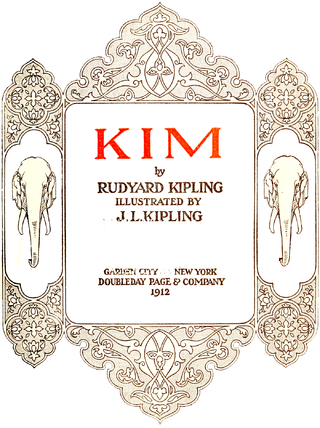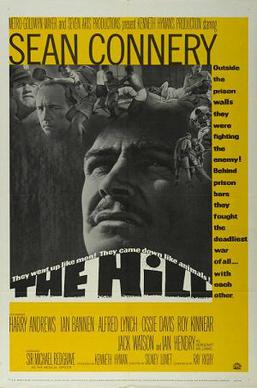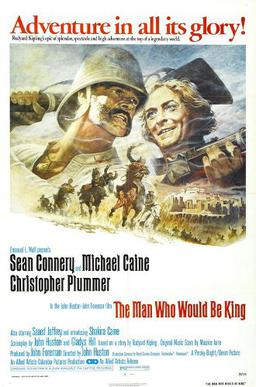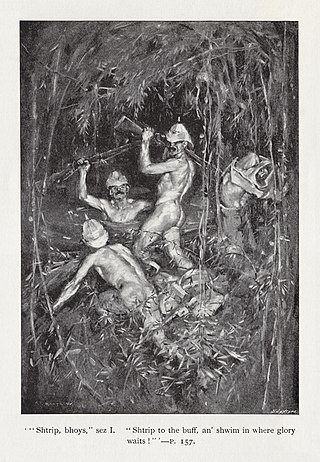
Joseph Rudyard Kipling was an English novelist, short-story writer, poet, and journalist. He was born in British India, which inspired much of his work.
This is a bibliography of works by Rudyard Kipling, including books, short stories, poems, and collections of his works.

Kim is a novel by Nobel Prize-winning English author Rudyard Kipling. It was first published serially in McClure's Magazine from December 1900 to October 1901 as well as in Cassell's Magazine from January to November 1901, and first published in book form by Macmillan & Co. Ltd in October 1901. The story unfolds against the backdrop of the Great Game, the political conflict between Russia and Britain in Central Asia. The novel popularized the phrase and idea of the Great Game.

The Hill is a 1965 British prison drama film directed by Sidney Lumet, set in an army prison in North Africa during the Second World War. It stars Sean Connery, Harry Andrews, Ian Bannen, Ossie Davis, Ian Hendry, Alfred Lynch, Roy Kinnear and Michael Redgrave.

"Danny Deever" is an 1890 poem by Rudyard Kipling, one of the first of the Barrack-Room Ballads. It received wide critical and popular acclaim, and is often regarded as one of the most significant pieces of Kipling's early verse. The poem, a ballad, describes the execution of a British soldier in India for murder. His execution is viewed by his regiment, paraded to watch it, and the poem is composed of the comments they exchange as they see him hanged.

The Man Who Would Be King is a 1975 adventure film adapted from the 1888 Rudyard Kipling novella of the same name. It was adapted and directed by John Huston and starred Sean Connery, Michael Caine, Saeed Jaffrey and Christopher Plummer as Kipling. The film follows two rogue ex-soldiers, former non-commissioned officers in the British Army, who set off from late 19th century British India in search of adventure and end up in faraway Kafiristan, where one is taken for a god and made their king.

Plain Tales from the Hills is the first collection of short stories by Rudyard Kipling. Out of its 40 stories, "eight-and-twenty", according to Kipling's Preface, were initially published in the Civil and Military Gazette in Lahore, Punjab, British India between November 1886 and June 1887. "The remaining tales are, more or less, new."
In the British Army, a gentleman ranker is an enlisted soldier suited through education and social background to be a commissioned officer or indeed a former commissioned officer. Rudyard Kipling titled one of his poems, which was published in 1892, "Gentlemen-Rankers".
Learoyd is a surname of English origin. Notable people with the name include:
"The Three Musketeers" is a short story by Rudyard Kipling which introduces three fictional British soldiers serving in India in the later nineteenth century: the privates Learoyd, Mulvaney and Ortheris. These characters appear in many early Kipling stories. "The Three Musketeers" was first published in the Civil and Military Gazette on 11 March 1887. It appeared in book form in Plain Tales from the Hills (1888).
Soldiers Three is a collection of short stories by Rudyard Kipling. The three soldiers of the title are Learoyd, Mulvaney and Ortheris, who had also appeared previously in the collection Plain Tales from the Hills. The current version, dating from 1899 and more fully titled Soldiers Three and other stories, consists of three sections which each had previously received separate publication in 1888; Learoyd, Mulvaney and Ortheris appear only in the first section, which is also titled Soldiers Three. The books reveal a side of the British Tommy in Afghanistan rarely seen in the Twilight of the British Empire. The soldiers comment on their betters, act the fool, but cut straight to the rawness of war in central Asia as the British began to loosen their Imperial hold.
Mulvaney or Mulvany is a surname. Notable people with the surname:
The Indian Railway Library was an enterprise conducted in Allahabad from 1888. It was a publishing venture of A. H. Wheeler & Co., who "had the monopoly on bookstall sales on Indian railway stations" It was a series of pamphlets intended to catch the interest of railway passengers, and offer cheap "throwaway" reading material.
"Yoked with an Unbeliever" is a short story by Rudyard Kipling. It was first published in the Civil and Military Gazette on December 7, 1886, and in book form in the first Indian edition of Plain Tales from the Hills in 1888. It also appears in subsequent editions of that collection.

"The Taking of Lungtungpen" is a short story by Rudyard Kipling which was first published in the Civil and Military Gazette on 11 April 1887. In book form, the story appeared in the first Indian edition of Plain Tales from the Hills in 1888, and in subsequent editions of that collection.

Under the Deodars is a collection of short stories by Rudyard Kipling.

Soldiers Three is a 1951 American adventure film based upon an element of several short stories by Rudyard Kipling featuring the same trio of British soldiers, portrayed in the film by Stewart Granger, Robert Newton, and Cyril Cusack. The picture was directed by Tay Garnett.

The Sheikh and the Dustbin is the third and last collection of short stories by George MacDonald Fraser, featuring a young Scottish officer named Dand MacNeill. It is a sequel to The General Danced at Dawn and McAuslan in the Rough and concerns life in a Highland Regiment after the end of the Second World War.
A Choice of Kipling's Verse, made by T. S. Eliot, with an essay on Rudyard Kipling is a book first published in December 1941. It is in two parts. The first part is an essay by American-born British poet T. S. Eliot (1888–1965), in which he discusses the nature and stature of British poet Rudyard Kipling (1865–1936). The second part consists of Eliot's selection from Kipling's poems.
Private George Flaxman of the Leicestershire Regiment was hanged at Lucknow maidan on 10 January 1887. He had been convicted by court-martial of the murder of Lance Sergeant William Carmody of the same regiment on or around 9 September 1886. The event may have inspired Rudyard Kipling's poem "Danny Deever", which describes similar events.









